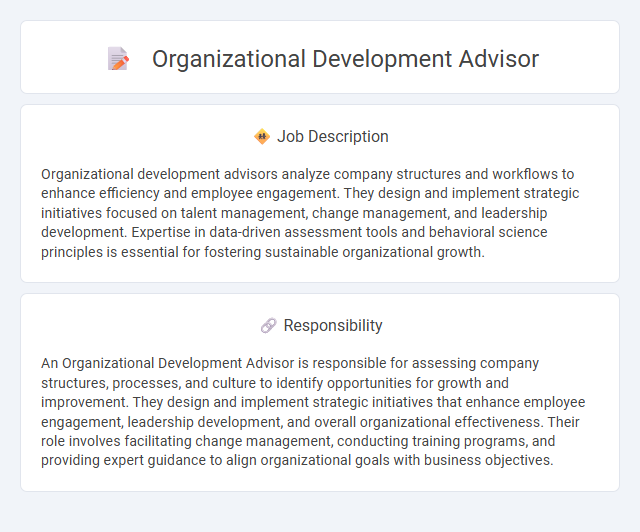
Organizational development advisors analyze company structures and workflows to enhance efficiency and employee engagement. They design and implement strategic initiatives focused on talent management, change management, and leadership development. Expertise in data-driven assessment tools and behavioral science principles is essential for fostering sustainable organizational growth.
Individuals with strong interpersonal skills, empathy, and a passion for improving workplace culture are likely to be well-suited for an Organizational Development Advisor role. Those who thrive in environments requiring strategic thinking, problem-solving, and effective communication may find this position fulfilling and impactful. Conversely, people who prefer routine tasks or struggle with change management might face challenges adapting to the dynamic demands of this job.
Qualification
An Organizational Development Advisor typically requires a bachelor's or master's degree in organizational psychology, human resources, business administration, or a related field. Proven experience in change management, talent development, and strategic planning is essential for success in this role. Strong skills in data analysis, communication, and project management enhance the advisor's ability to drive effective organizational transformation initiatives.
Responsibility
An Organizational Development Advisor is responsible for assessing company structures, processes, and culture to identify opportunities for growth and improvement. They design and implement strategic initiatives that enhance employee engagement, leadership development, and overall organizational effectiveness. Their role involves facilitating change management, conducting training programs, and providing expert guidance to align organizational goals with business objectives.
Benefit
Hiring an Organizational Development Advisor likely improves company efficiency by identifying growth opportunities and streamlining processes. They probably enhance employee engagement and leadership skills, fostering a more motivated and productive workforce. This role might also support change management initiatives, increasing the organization's adaptability in dynamic markets.
Challenge
Organizational development advisors likely face the challenge of aligning diverse team dynamics with strategic goals while managing resistance to change. They probably need to balance short-term operational demands with long-term developmental initiatives, requiring strong negotiation and communication skills. Navigating complex corporate cultures may also present difficulties in implementing effective interventions.
Career Advancement
Organizational development advisors drive strategic initiatives that enhance workplace culture, improve employee engagement, and streamline operational processes, positioning themselves for leadership roles in HR or corporate strategy. Mastery in change management, talent development, and data-driven decision-making significantly boosts career growth opportunities within multinational corporations and consultancy firms. Continuous learning through certifications such as Prosci Change Management or SHRM-SCP fosters professional advancement and access to senior advisory positions.
 kuljobs.com
kuljobs.com